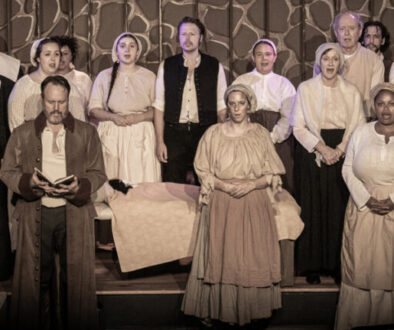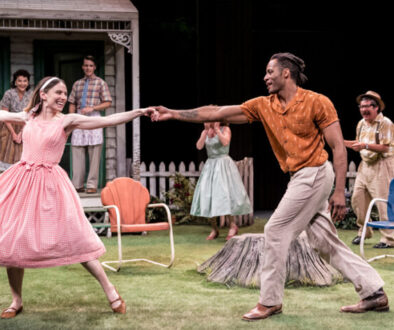By ALAN SMASON, WYES-TV Theatre Critic (“Steppin’ Out“)
One of the most misquoted of Shakespeare’s lines is “Heavy is the head that wears the crown.” The actual line from Henry IV, Part Two is “uneasy lies the head that wears the crown,” but in the New Orleans Shakespeare Festival’s latest production of the Scottish play, both quotes may actually be á propos.

The head that wears this crown for most of this play is the titular lead played by John Niesler, an eminent and effective actor, who returns to perform a work by the Bard for the first time in two years. His stellar work in films and other contemporary dramas have amassed for him superlatives for his acting chops and there is no doubt that he is among the best New Orleans has to offer.
However, in this production of Macbeth, presented by the New Orleans Shakespeare Festival (NOSF), the heaviness with which he performs oftentimes interferes with the poetry of the lines and leaves one feeling slightly uneasy as to several of his acting choices. The Scottish king is, after all, a paranoid, convinced that everyone is out to get him when they clearly are not. It is his actions, prompted by his anxious and power hungry shrew of a wife, that turn him into an assassin and, later, into a bloodthirsty tyrant, who so rankles the contract between him and his people that they fittingly do rise up to overthrow him.
Niesler is a believable despot. At first, he justifies his bloody actions as a means of self-preservation, but a blind hubris leads him down the dark, twisted path of his own destruction. Sometimes, the rhyming scheme of Shakespeare’s iambic pentameter is lost in this process. This slightly diminishes an otherwise powerful interpretation, although it should be stated that Niesler’s intensity level is properly executed. Were this intermittent loss of poetic expression not to have been noticeable, this production of Macbeth might have been deemed as truly magnificent. Nevertheless, it still ranks as one of the best interpretations seen on a local stage in some time.

As for Lady Macbeth, Melisande Cook is nothing short of superb. Perhaps it is because she has largely worked in theatre as a director that she seems to know innately how the villainous spouse should be played with both cunning guile and an inhumane heart. Her thirst for power knows no bounds until it ultimately destroys the man she loves and turns her mad in so doing. Sadly, this performance may be one of the last we will see of Cook, who leaves her position as a member of the adjunct faculty at Tulane very soon. Audiences should not miss this outstanding performance, her first as an actress on a New Orleans Shakespeare Festival stage since the 1995 production of the very same play, when she played a supporting role as a mere teenager.
Sam Malone is also exceptional in his role as Banquo, Macbeth’s friend at the outset of the play, but who falls victim to the king’s attempt to solidify his power by eliminating potential adversaries. Last seen on the Southern Rep stage in the role of Ulysses/Hero in Father Comes Home from the Wars, Parts 1-3, Malone commands a stage presence that is forceful and in the moment.
Burton Tedesco also renders a compelling portrait of Macduff, the lord who flees the country in advance of Macbeth’s vendetta against him, unwittingly leaving his wife and family behind in the process. Last seen in the comic role of Lefeu and as the Duke in All’s Well That Ends Well, Tedesco shows he has tremendous ability to portray comic or dramatic characters with equanimity. He also serves this production as the fight director, a critical part of the overall direction of this work.
Graham Burk’s performance as the unsure Malcolm, who must be prevailed upon to take back the Scottish throne by Macduff, is also special. His role as Lavache, the Clown, in last month’s All’s Well That Ends Well was also well done and shows the range of the work he can master.

Khiry Armstead, James Bartelle, Brendan Bowen and Sean Patterson all do journeymen work in support of this production. Beverly Trask, Celeste Cahn and Cammie West are also extremely effective as the three witches, so integral in the story as to at first inspire the man who would be king and later to falsely give him the impression that he is invincible. Elsewhere in the play, Trask and West do additional duties as both an old woman and Macduff’s wife, respectively. West also manages to play nursemaid to her very own son, Finnian Patterson (also Sean’s son), in the scene in which he makes his stage debut playing one of Macduff’s young sons.
Tony Medlin plays two small, but significant roles in the play. As Duncan, he is the first to fall victim to Macbeth and his lady’s lust for power in Act One. In the second act, he plays the doctor who is summoned to deal with the onset of madness bedeviling Lady Macbeth. In both instances he handles his parts with depth and feeling.

Directed by Jessica Podewell, the work is presented in a sparse set on several levels designed by Joan Long with several clever modern interpretations. A bank of florescent lights is used to emulate the light of battle, while the cauldron at the beginning of Act Two is a hole in the middle of the darkened stage floor through which a red light gleams as the witches add ingredients to their potion.
As the lighting designer, artistic director Martin Sachs continues to hold a very high standard that others have tried to follow for decades. Sound is designed well by Kevin O’Donnell out of Chicago and costumes were executed largely to good effect by Jennifer Jacobs, who was responsible for recent NOSF productions of Shakespeare’s The Taming of the Shrew, The Tempest and The Two Gentlemen of Verona.
Macbeth by William Shakespeare continues its sold-out run at the Lupin Theater in the Dixon Hall Annex this week and next week. The only shows available are evenings of its final week from Thursday, July 17 through Saturday, July 21 at 7:30 p.m. The final matinee will be seen on Sunday, July 22 at 1:30 p.m. For tickets, click here. For more information, call 504-865-5106.





